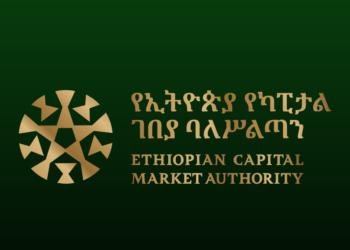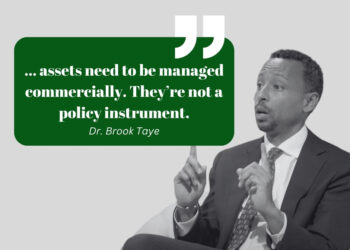Ethiopia stands on the cusp of an economic transformation, one that hinges on the development of a thriving capital market. Ermias Amelga, a seasoned investment banker with deep insights into Ethiopia’s financial landscape, shared his vision for how the country can unlock its economic potential through a well-structured and fully functional capital market.
With a rich background in investment banking and international economics, Ermias offers a compelling roadmap, drawing from his personal journey and global economic trends to reimagine Ethiopia’s financial future.
A Pioneer’s Tale: The Birth of Investment Banking in Ethiopia
In 1995, Ermias ventured into uncharted waters by establishing Access Capital Services, Ethiopia’s first investment bank.
Reflecting on his journey, Ermias highlights the critical role of research and macroeconomic understanding in building a sustainable financial institution. He underscores the importance of deep sectoral knowledge and a commitment to creating value through informed decision-making.
More importantly, he points out that financial sector liberalization is the bedrock of capital market development. Without open policies and a regulatory framework conducive to investment, the growth of any capital market remains stifled.
Why Ethiopia Needs a Capital Market
Ermias’s argument for a robust capital market is straightforward: it is a necessary tool for economic growth. He envisions a dual system, encompassing both over-the-counter trading and a formal stock exchange, to ensure efficient capital allocation.
“In an economy as complex and rapidly evolving as Ethiopia’s, a capital market is not a luxury—it’s an imperative,” he asserts. Such a market would act as a regulatory mechanism, channeling investments toward the most productive sectors while fostering economic stability.
By enabling transparent pricing mechanisms and access to capital, a well-functioning market could open doors for businesses and entrepreneurs who currently lack the resources to scale.
Building the Foundations of Success
Ermias lays out a clear blueprint for creating a successful capital market. He emphasizes two fundamental components:
- Hard Infrastructure – The physical backbone, such as stock exchange buildings and trading platforms.
- Soft Infrastructure – The policies, legal frameworks, and human capital that ensure the market operates transparently and efficiently.
Transparency is especially crucial, as it builds investor confidence.
“Reliable financial data, such as audited statements and prospectuses, are non-negotiable,” he explains.
A strong regulatory environment and a stable banking sector further enhance the ecosystem, creating fertile ground for capital market growth.
Challenges Amid Opportunity
Ethiopia faces its share of economic hurdles. High inflation, currency devaluation, and declining investment levels have created an uncertain financial environment. Yet, Ermias sees a silver lining.
“The current challenges also present opportunities,” he says, pointing to Ethiopia’s young and dynamic population as a cornerstone for future growth.
With proper investment strategies, this demographic dividend could become a catalyst for economic development.
Learning from Africa’s Trailblazers
Ermias urges Ethiopia to look outward for inspiration, particularly to countries like Kenya and South Africa, which have established thriving stock exchanges.
He emphasizes the importance of pro-investment policies, including tax incentives, to attract both domestic and foreign capital. With the right approach, Ermias believes Ethiopia’s stock exchange could eventually reach valuations in the billions, becoming a key player in Africa’s financial ecosystem.
A Global Perspective on Local Potential
Ermias’s vision is not confined to Ethiopia. He connects the country’s future to global macroeconomic trends, noting the rise of new technologies and shifting geopolitical landscapes.
Technological advancements, like AI, present Ethiopia with an opportunity to leapfrog traditional industrialization hurdles. By embracing these innovations, the country could accelerate its economic transformation, positioning itself as a competitive player in the global market.
The Road Ahead
Developing a thriving capital market is not just about economic growth; it’s about creating a resilient financial system that can weather challenges and leverage opportunities.
Ethiopia’s path to success lies in building the necessary infrastructure, learning from regional leaders, and fostering a culture of transparency and innovation. As the country embarks on this journey, the vision shared by pioneers like Ermias could pave the way for a brighter, more prosperous future.
Source: This article is written from his interview with Meri Podcast























